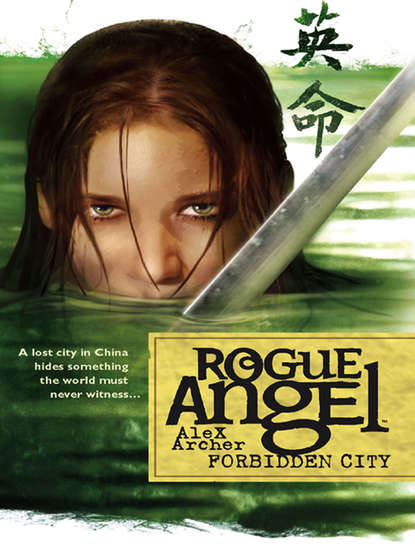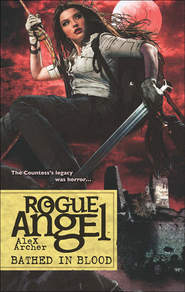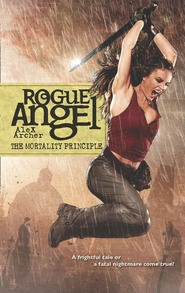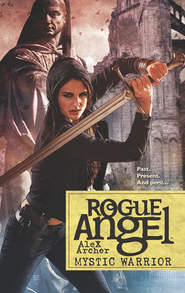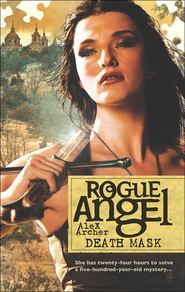По всем вопросам обращайтесь на: info@litportal.ru
(©) 2003-2024.
✖
Forbidden City
Автор
Год написания книги
2019
Настройки чтения
Размер шрифта
Высота строк
Поля
A century and a half earlier, wagons had carved deep ruts in the land and left scars that would last generations.
“You’re in very good shape.” Huangfu adjusted his backpack. When he spoke, his breath was gray in the cool air for just a moment until the breeze tore it away.
Huangfu was in good shape, as well. Annja knew that because the pace she’d set had been an aggressive one. The man hadn’t complained or fallen behind. When she’d realized what she was doing and that she should have been going more slowly, she’d expected to find him out of breath and struggling to keep up. Instead, he’d been fine.
“I have to be in good shape in my profession.” Annja rethought that. “Actually, I don’t have to be, but I want to be. It comes in handy.” Especially when someone’s trying to kill me. That had occurred far too much lately. Ever since she’d found the last piece of Joan of Arc’s sword in France.
Before that, before Roux and Garin had entered her life, Annja had never once considered the possibility that she might ever have been connected to Joan of Arc. The sword, or maybe it was Annja herself these days, seemed to draw trouble like a magnet.
That was the downside, however. The upside was that whatever karma she presently lived under was taking her places she’d only dreamed of.
“I didn’t think television people actually needed to exercise. Only that they look so.” Huangfu smiled, showing that he meant no disrespect.
“Television isn’t exactly my profession.” Even though she’d been hosting spots on Chasing History’s Monsters for a while now, Annja still felt embarrassed. But doing the show allowed her to go more places than she would have been able to on her own as an archaeologist. Television shows tended to be better funded than the universities that would have hired her as a professor.
Likewise, the show had given Annja more international recognition than the hundreds of articles, monographs, and couple of books she’d written. She knew many of those publishers wouldn’t have considered her work if she hadn’t had the large underground fan base Chasing History’s Monsters had provided. And more of those published pieces had been for laymen than for professionals.
Unfortunately, the recognition was a double-edged sword. Many people tended to think of her as a television personality first and an archaeologist second. Annja never thought of herself that way. What she often gained in access she lost in credibility.
“It wasn’t the television personality I asked to help me—it was the archaeologist,” Huangfu said.
Annja smiled a little. She still wasn’t sure if Huangfu was flirting with her or simply being disarming. She was wrong about that more often than not, too. “Thank you,” she finally said.
They walked for a time. Annja took out the GPS device in her coat pocket and checked their location.
“Do you get many offers to do something like this?” Huangfu opened his canteen and took a sip of water.
“To go looking for someone’s ancestors?” Annja replaced the location device and uncapped her own canteen. “I do get a number of offers.”
“Do you answer them all?”
“No. I wouldn’t have time,” Annja replied.
Huangfu smiled. “Then what was it about my offer that interested you?”
“The family heirloom you’re looking for. That interested me.”
“Because it is a—” Huangfu paused, reflecting. English was not his native language, and he wasn’t as skilled as Annja had expected for someone who worked in international trade circles. He shrugged and shook his head. “I can’t remember what you called it.”
“I was fascinated because of the Scythian art,” she said as she started walking again.
“Yes. You said the Scythians were a nomadic people.”
“They were. In all probability, they were Iranian, but they were known by different names. The Assyrians knew them as the Ishkuzai. The Greek historian Herodotus of Halicarnassus described them as a tribe called the Kimmerioi, which was expelled by the Ishkuzai. The Kimmerioi were also known as Cimmerians, Gimirru in the histories left by the Assyrians.” Annja smiled. “Some people think Robert E. Howard borrowed the Cimmerian culture for his hero, Conan the Barbarian.”
Huangfu shook his head. “I don’t know those names. My ancestors were Chinese.” The words came sharply, edged with barely concealed rebuke.
Evidently Huangfu was, if not somewhat prejudicial, somewhat race conscious. Annja was aware that a number of Asian cultures looked down on each other. Regionalism divided civilization as surely as skin color, religion, and wealth.
“I didn’t mean to infer that they weren’t,” she said.
For just a moment Annja wished she’d passed on the offer to act as guide for Huangfu. She’d spoken the truth when she’d said she regularly got offers to investigate all sorts of esoterica people thought might end up as an episode of Chasing History’s Monsters.
If it hadn’t been for the Scythian art, she’d have passed on this. Looking for dead ancestors didn’t make her Top Ten List.
“The Scythian people traded with the Chinese beginning in the eighth century,” Annja went on. “Probably before that. But archaeologists and historians have been able to track the gold trade to that time period. All I was suggesting was that the design you found in your ancestor’s journals might be older than you think it is.”
Huangfu nodded, mollified to a degree. “Ah, I see. You think helping me find my ancestor might give you more information about the Scythian people.”
“I hope so. It would be a coup if I do. I hope I don’t sound insensitive.”
“Nonsense. I’m here for a man I’ve never met. If it weren’t for my grandfather, I might not be here at all. Are these people you hope to discover more about important?”
The grade went down for a while and became a minefield of broken rock and low brush. “There is a lot we don’t know about the Scythians. Located as they were in Central Asia, trading with China, Greece, what is now Eastern Europe, Pakistan and Kazakhstan—probably other nations, as well—there’s a wealth of history that archaeologists, historians, and linguists are missing.”
Annja took another GPS reading, then corrected their course. She’d confirmed the directions she’d gotten over the Internet with the local Ranger station and with the people in Georgetown, which was a small town only a few miles to the west.
“What do you hope to find?” Huangfu asked.
“The same thing that you do. Some proof that your ancestor was—” Annja stopped herself from saying murdered in Volcanoville just in time “—here.”
Annja followed a small stream through the fringe of the Eldorado National Forest. According to her map, they weren’t far from Otter Creek. Paymaster Mine Road was supposed to be only a short distance ahead.
Tall pines mixed with assorted fir trees. All of them filled the air with strong scents. Sunlight painted narrow slits on the ground. Powdered snow covered patches of the ground. Squirrels and birds met the spring’s challenge, foraging for food in the trees, as well as on the ground.
“He is here.” Huangfu’s face looked cold and solemn. “I intend to bring my ancestor’s bones home, if I am able, and see him properly laid to rest. It is my grandfather’s wish to gather all of our family that we may find.”
Scanning through the forest, Annja found the trail she thought they wanted. The trail rose again with the land.
Everything is uphill out here, she thought.
The park rangers she’d talked to over breakfast in Georgetown had assured Annja the path she planned to trace was an arduous one. Only hikers, horses and bicycles were allowed into the protected areas.
The muddy land was sloughing away under the melting snow. Rainfall for days had turned the ground soft in places. They’d have struggled on bikes and Huangfu had said he wasn’t a horseman so Annja had elected to walk to the location.
“Are we close?” Huangfu asked.
“I believe so. Another mile or so should put us there.” Annja kept walking.
V OLCANOVILLE WAS ONE of the hundreds of towns and mining camps that had sprung up in California after James W. Marshall, an employee of John Sutter’s lumber mill, discovered gold flecks in the tail race in January of 1848. By the end of that year, word had spread and hundreds of thousands of people from around the world had flocked to the most recent member of the United States.
The mining camps and towns had risen up like dandelions, springing full-born almost overnight, then dying in the same quick fashion when the gold ran out or was never found. Hell Roaring Diggings, Whiskey Flat, Loafer’s Hollow, and others had each left behind something of a history in the area. But separating the true stories from those that had been embroidered later, or from the lies they’d been mixed with from the beginning, was almost impossible. As with any history, murder, betrayal, success and failure were all part of the tapestry.
Huangfu gazed at the ramshackle buildings that stood under a thick canopy of trees. Many of the trees showed signs of repeated lightning strikes. Broken limbs, shattered trunks, and places bare of bark were scattered around the site.
Not exactly a place to inspire hope, Annja thought as she turned to Huangfu. “It’s not as bad as it looks.”
The man offered her a faint smile. “That’s good. Because at the moment it looks impossible.”





